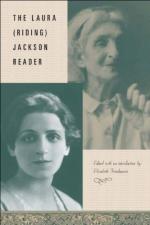|
This section contains 8,854 words (approx. 30 pages at 300 words per page) |

|
SOURCE: McGann, Jerome J. “Laura (Riding) Jackson and the Literal Truth.” Critical Inquiry 18, no. 3 (spring 1992): 454-73.
In the following essay, McGann explores the relationship between language, poetry, and truth in Riding's.
I heard poems inhabited by voices.
—Susan Howe, “Thorow”
Can poetry tell the truth? This question has embarrassed and challenged writers for a long time. While the question may be addressed at both an ethical and an epistemological level, its resonance is strongest when the ethico-political issues become paramount—as they were for both Socrates and Plato.
Today the question appears most pressing not among poets but among their custodians, the critics and academicians.1 Whether or not poetry can tell the truth—whether or not it can establish an identity between thought and its object—has become an acute problem for those who are asked to bring critical judgment to the matter. To the extent that a...
|
This section contains 8,854 words (approx. 30 pages at 300 words per page) |

|


